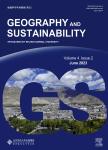Sustainability and virtual water:The lessons of history
作者机构:UNESCO Chair on Aflaj Studies and Archaeo-HydrologyUniversity of NizwaNizwaOman WaterEnergy and Environmental Engineering UnitFaculty of TechnologyUniversity of OuluOuluFinland
出 版 物:《Geography and Sustainability》 (地理学与可持续性(英文))
年 卷 期:2022年第3卷第4期
页 面:358-365页
学科分类:082802[工学-农业水土工程] 0709[理学-地质学] 08[工学] 0303[法学-社会学] 0710[理学-生物学] 0830[工学-环境科学与工程(可授工学、理学、农学学位)] 0828[工学-农业工程] 0708[理学-地球物理学] 0705[理学-地理学] 0815[工学-水利工程] 0813[工学-建筑学] 0833[工学-城乡规划学] 0713[理学-生态学] 0834[工学-风景园林学(可授工学、农学学位)]
基 金:Oulun Yliopisto
主 题:Proto-industrialization Water scarcity Non-hydraulic polity Virtual water Political economy
摘 要:This article aims to show that virtual water has historically been an adaptation strategy that enabled some arid regions to develop a prosperous economy without putting pressure on their scarce water *** water is referred to as the total amount of water that is consumed to produce goods and *** an example,in arid central Iran,the deficiency in agricultural revenues was offset by more investment in local industries that enjoyed a perennial capacity to employ more *** revenues of local industries weaned the population from irrigated agriculture,since most of their raw materials and also food stuff were imported from other regions,bringing a remarkable amount of virtual *** virtual water not only sustained the region’s inhabitants,but also set the stage for a powerful polity in the face of a rapid population growth between the 13th and 15th centuries *** resultant surplus products entailed a vast and safe network of roads,provided by both entrepreneurs and ***,it became possible to import more feedstock such as cocoons from water-abundant regions and then export silk textiles with considerable *** article concludes that a similar model of virtual water can remedy the ongoing water crisis in central Iran,where groundwater reserves are overexploited,and many rural and urban centers are teetering on the edge of socio-ecological *** holds an urgent lesson on sustainability for our today’s policy that stubbornly peruses agriculture and other high-water-demand sectors in an arid region whose development has always been dependent on virtual water.



